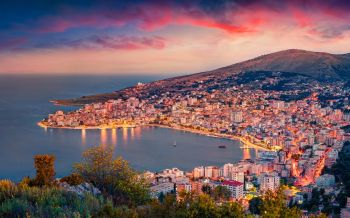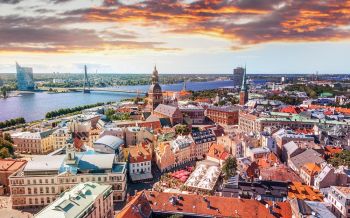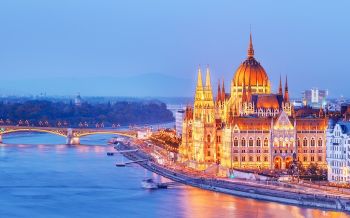Bulgaria has said it will enter into “very difficult” negotiations concerning a new gas contract with Gazprom despite the Russian company cutting off all supplies to the country this spring. This comes amid pressure from trade unions to secure gas supplies for the coming winter and as a plan to import several LNG cargoes from Cheniere this winter fell through.
A government statement published on Monday said representatives of trade unions and employers' organisations had "united around the position" that the government should resume negotiations with Gazprom.
“Obviously we'll have to address them,” said energy minister Rosen Hristov in the statement, in Bulgarian.
“I expect the negotiations with Gazprom to be very difficult, because of everything done so far. It is very difficult to get someone to sell you cheap gas, when the price on the stock exchange in Europe is many times higher," Hristov added.
Gazprom cut off all supplies to Bulgaria in April this year following Sofia’s refusal to pay for gas in rubles. The contract was due to expire by the end of the year. All eyes are now on Gazprom and how the company will respond to the request for negotiations.
Other EU nations may also be forced to approach Gazprom to secure gas this winter, although Bulgaria looks more vulnerable in terms of supply security than for example Poland, Denmark and Finland which have also been cut off completely from Russian supply after the EU member states also refused to adhere to the ruble payment request.
Meanwhile, Hungary's minister of economic development, Marton Nagy, reportedly flew to Moscow on Sunday for talks on energy supplies. The country, whose Prime Minister Viktor Orbán is seen as an ally of Vladimir Putin, plans to import 700 MMcm of additional Russian gas on top of the volumes already contracted with Gazprom.
Should Bulgaria restart Russian gas delivers and Hungary increasing imports from Gazprom, the moves would dent the EU’s bid for a unified position on reducing Russian gas imports by two thirds this year and ending imports of Russian energy by 2030.
Alternative supplies
Bulgaria has taken steps to reduce its dependence on Russian gas in recent years. It has contracted to take 1 Bcm/year of gas from Azerbaijan via the Trans Adriatic Pipeline (TAP) and the EU-backed 3 Bcm/year Interconnector Greece-Bulgaria (IGB), which is expected to start commercial flows in winter 2022, will help facilitate this. Bulgaria currently has one interconnector with Greece, the Kulata-Sidirokastro cross-border link.
LNG imports via Greece and the IGB is also an option but competition for cargoes is fierce.
On Friday, Hristov announced that Bulgaria would only buy one LNG cargo from Cheniere this winter, instead of seven cargoes as previously planned, citing loading slots that were not competitively priced.
“We were able to negotiate an unloading slot in Turkey at a competitive price and this allowed us to accept Cheniere's offer for the delivery of one LNG tanker for October,” Hristov said.
Bulgaria had originally planned to import 1 cargo from Cheniere in both November and December and four cargoes at the beginning of next year.
According to the minister, the LNG cargo arriving in October will cover about a third of the country's gas consumption in that month. Another third will be met through gas deliveries from Azerbaijan. For the remaining third, options are yet to be found, he said.
There is, for example, interest from Turkish companies to supply Bulgaria and talks will begin this week on increasing the quantities imported from Azerbaijan, Hristov said.
The minister said piped gas is preferred “as it provides better security of supply,” according to the statement. However, as a possible long-term option, the energy ministry is also considering bidding in the auctions for 2024 slots at the Revithoussa terminal in Greece.
“If we manage to negotiate this, we will also purchase liquefied gas, as it is currently available,” the energy minister said, according to the statement.
The Bulgarian government has also said it will refinance Bulgargaz, the state gas company, which is currently struggling to pay for gas deliveries from abroad.
Bulgaria consumed 3.3 Bcm of gas in 2021, according to BP statistics, with most of the volumes supplying industry. Power generation is dominated by coal and nuclear power. - AW
Subscription Benefits
Our three titles – LNG Business Review, Gas Matters and Gas Matters Today – tackle the biggest questions on global developments and major industry trends through a mixture of news, profiles and analysis.
LNG Business Review
LNG Business Review seeks to discover new truths about today’s LNG industry. It strives to widen market players’ scope of reference by actively engaging with events, offering new perspectives while challenging existing ones, and never shying away from being a platform for debate.
Gas Matters
Gas Matters digs deep into the stories of today, keeping the challenges of tomorrow in its sights. Weekly features and interviews, informed by unrivalled in-house expertise, offer a fresh perspective on events as well as thoughtful, intelligent analysis that dares to challenge the status quo.
Gas Matters Today
Gas Matters Today cuts through the bluster of online news and views to offer trustworthy, informed perspectives on major events shaping the gas and LNG industries. This daily news service provides unparalleled insight by drawing on the collective knowledge of in-house reporters, specialist contributors and extensive archive to go beyond the headlines, making it essential reading for gas industry professionals.






